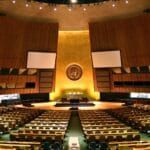Nonproliferation reflections, from a Kosovo minefield
By Brenna Gautam | October 24, 2017
Gazing across the mountains of Dulje Pass in Kosovo on a cool morning in August 2017, I tried to picture these same mountains erupting in bloodshed 18 years earlier. The surrounding roads and infrastructure have boomed during that span of years, creating a mirage of peace and stability. But just below the surface, landmines remain as a hidden relic of past conflict, and continue to inflict pain on innocent victims all these years later.
To a law student interested in arms control, diving into Kosovo’s demining efforts sounded like an ideal summer project. Little did I know that, from this developing country, a slew of broader lessons for disarmament in the nuclear field would emerge—a gift from the land of blood and honey at a time when humanity desperately needs to learn from what’s buried beneath Kosovo’s soil. Now that I am back home in the United States, a country recklessly flirting with a nuclear arms race on the Korean Peninsula, I want to articulate and apply these lessons to domestic nuclear nonproliferation efforts.
The importance of education. Today in Kosovo, landmines remain the longest-lasting and most indiscriminate weapons of war. I have held these weapons in my hands: Anti-vehicle mines, designed to destroy tanks, are blunt and heavy; anti-personnel mines, designed to shatter or pulverize the bodies of soldiers, are light and plastic, almost like toys. Even if a victim is lucky enough to escape death, a detonated landmine can cause disfiguration, blindness, and the loss of limbs. Because of their height and size, children often experience the worst of these effects.
The tragedy of children as victims of landmines brought me to my first lesson: the necessity of awareness and education. To combat youth fatalities, Kosovo has implemented education initiatives in mine awareness. Instructors travel to schools across the country, demonstrating how to identify weapons, and warning of the devastation they can cause.
Learning about these initiatives, I was struck by their dual purpose of keeping children safe from picking up ordnance while simultaneously reinforcing the humanitarian and ethical issues related to mines. It made me wonder: Where is the nuclear education here in America? How can US politicians hope to see a future without nuclear weapons when our public schools are failing to teach the younger generation about their inherent dangers? Why are disarmament education initiatives like the Critical Issues Forum, which introduces high school students to nonproliferation issues through a project-based curriculum, not more widespread?
A process that requires patience. Despite Kosovo’s education initiatives, and despite deminers who have been working nearly nonstop since 1999, more than 100 “Dangerous Areas” (uncleared areas containing unexploded ordnance) remain in Kosovo. In 2016 alone, 88,778 explosive items were found and destroyed. Here in Kosovo, where the struggle to live free from landmines has been fought over the course of decades, lies a second cautionary tale: In the rush to rid the world of weapons, patient verification is key.
In their hurry to meet landmine reduction goals, early demining programs in Kosovo inadvertently bred new problems. The United Nations informed locals that their country was landmine-free in 2001 and again in 2006, twice making miscalculations in an effort to score a disarmament victory. Mere weeks after the 2006 pronouncement, a landmine caused a tragic fatality near the Pristina airport. To this day, it is no wonder that when a stretch of land is declared “mine free,” villagers may nevertheless doubt the safety of the soil.
Rather than rushing to declare triumphs, disarmament in any form requires patient verification at each step of the process: not just to meet procedural requirements, but to gain the trust and ensure the safety of those most affected. Nuclear disarmament should similarly be achieved through verifiable steps, with the support of treaties that involve technical monitoring—such as the Comprehensive Nuclear Test Ban Treaty or the Joint Comprehensive Plan of Action.
Patience is needed not just for verification but also for the process of mine clearance itself: On my first field visit with The HALO Trust, the world’s largest humanitarian mine clearance organization, I was surprised by how slowly their manual deminers work. They clear vegetation delicately and sweep over the soil inch by inch—methodically, almost reverently. They speak to each other rarely, instead working only to the quiet buzzing of detection equipment. This work is studded with challenges: from cattle wandering into uncleared areas; to rainfall shifting the soil around buried mines; to garbage setting off metal detectors.
Building confidence. Political instability in northern Kosovo, resulting in denied access to minefields, is another challenge, but it is one that has led to conflict transformation, as Serbians and Albanians have begun to cooperate in demining. This third lesson is one of disarmament as a confidence building measure.
At The HALO Trust headquarters, a wall map of remaining Dangerous Areas is updated daily with tiny green and red pins to track progress. The area surrounding the capital is nearly entirely green, meaning that minefields have been almost completely eradicated in the Albanian-majority city of Pristina. But in the Serbian-majority north, the map explodes with red.
Tensions between Serbians and Albanians in Kosovo are deeply entrenched, with battles stretching back to the 1300s. In Gjakova, a small city I toured during a field visit, Serbian forces killed 287 Kosovo Albanians during Serbian President Slobodan Milošević’s command. Because of this, Serbian deminers are generally unwelcome in the Albanian municipalities and vice versa.
But through mine clearance, Serbians and Albanians have found common ground to work in cooperation. This partnership is more than a mere cultural exchange to break down stereotypes; the Serbian deminers risking their lives daily with mine-clearing organizations in the northern region of Kosovo coordinate and share information with the Albanian deminers of the Kosovo Mine Action Coordination Center, one of the four sectors of the Operations and Training Department within the Ministry for the Kosovo Security Forces. They rely on each other to help make their shared world a safer place, and, in doing so, have begun to develop trust for future projects.
Similarly, cooperation on nuclear security and nonproliferation initiatives has the possibility to transform political instability through confidence building. Efforts at nuclear disarmament must be inclusive. By involving the “other” in these efforts, barriers are broken, and trust is fostered.
Envisioning a safer world. When I ask Kosovar deminers about a mine-free future, it’s as if their bodies physically lighten. They spend their days working in grueling heat and mountainous terrain, constantly struggling to secure funding, fighting daily against remnants of a traumatic conflict that officially ended decades ago. What motivates them?
The answer is a vision: for a safe Kosovo, for land on which their children and grandchildren can run and play without fear.
As we continue searching for paths to nuclear disarmament, this may be the most important lesson of all. Yes, those of us working toward disarmament must engage and educate the youth, promote patient verification in our diplomacy, and seek out confidence-building opportunities. But most important, we must hold onto this vision of a safer world through the dark times ahead, even when the odds seem insurmountable. Especially when the odds seem unsurmountable. It’s the only way we can hope to succeed.
Together, we make the world safer.
The Bulletin elevates expert voices above the noise. But as an independent nonprofit organization, our operations depend on the support of readers like you. Help us continue to deliver quality journalism that holds leaders accountable. Your support of our work at any level is important. In return, we promise our coverage will be understandable, influential, vigilant, solution-oriented, and fair-minded. Together we can make a difference.
Topics: Nuclear Weapons, Voices of Tomorrow















